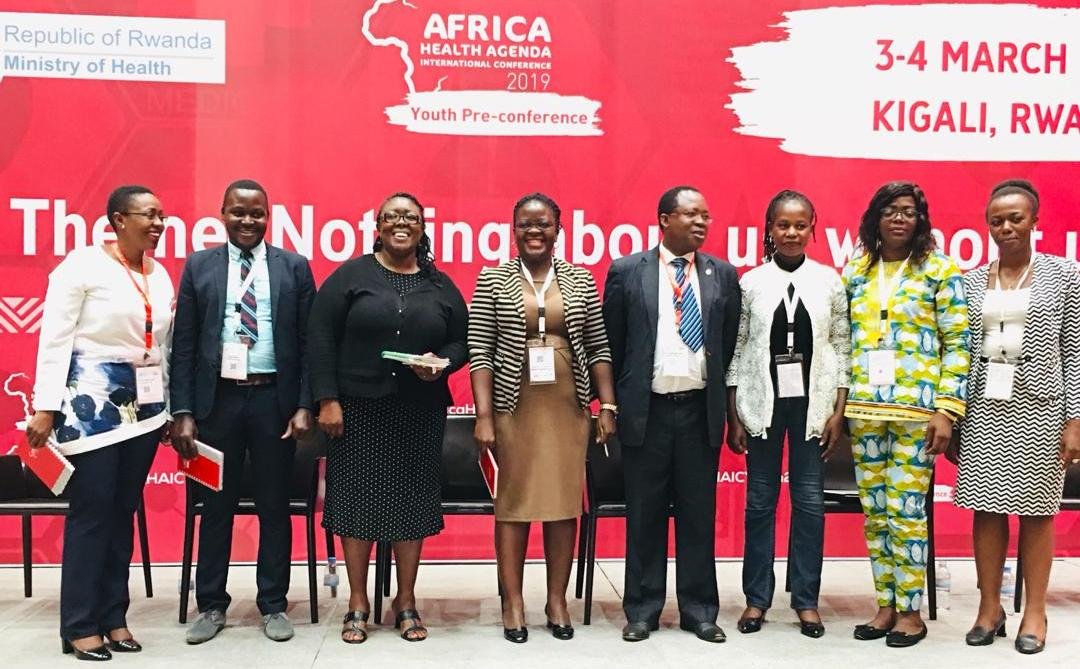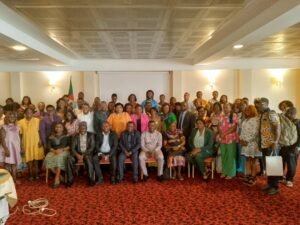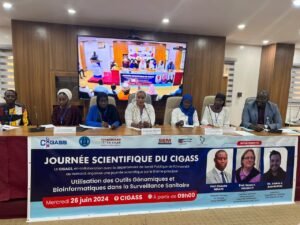 The leading sexual and reproductive health organization convened a meeting at the 2019 Africa Health Agenda international conference, held in Kigali-Rwanda. Focus was on the theme: “Leaving no one behind. How far are we?”
The leading sexual and reproductive health organization convened a meeting at the 2019 Africa Health Agenda international conference, held in Kigali-Rwanda. Focus was on the theme: “Leaving no one behind. How far are we?”
The side event of the International Planned Parenthood Federation (IPPF) Africa region, organized on the margins of the Africa Health Agenda international conference (AHAIC) 2019 appeared to be a great opportunity for the various participants who had an experience sharing session that will help them at the national level to speed-up the universal health coverage (UHC) programme. The participants brought together on March 5, 2019 by IPPF Africa region were experts of some renowned civil society organizations, parliamentarians, young people and media practitioners. The overall objectives of this side event as underscored were: to create knowledge and awareness on universal health coverage notably on the aspect of Sexual and Reproductive Health and Rights’ implementation in Africa; to draw recommendations that will help accelerate implementation and drive community-led, resilient, quality, inclusive and sustainable UHC, including Sexual and Reproductive Health and Rights (SRHR) and Family Planning outcomes. The meeting was equally aimed at getting decision makers to take positions and make commitments to remove barriers and accelerate implementation. Sexual and reproductive Health and Rights, according to experts present at this session are at the core of the right to health and of sustainable development, and a necessary precondition for gender equality and non-discrimination. UHC will not be achieved without the full inclusion of SRHR as a key element.
During the panel discussion, much was reviewed in terms of policies and reforms, highlights on Uganda as a “best practice” in the implementation of the UHC in the region was outlined by Dr. Dinah Nakiganda-Busiku, who is the assistant Commissioner for Reproductive Health at the ministry of health in Uganda. She said; Uganda has so far implemented projects driving towards the achievement of UHC.
On her part, Honorable Chege Maitu Sabina, Chairperson of the Parliamentary Health Committee in Kenya shared experiences on flagship programs among which are; the signature “Beyond Zero campaign”, the free maternal health care and measures put in place to address legal, socio-cultural and financial barriers ensuring expansion and acceleration of UHC in Kenya. Honorable Dr Christopher Kalila of Zambia on his turn underscored the big step made by his country in terms of UHC.
He said: “We have been strengthening our health system… We are at a moment when a bill on health insurance was passed on at the national assembly, this to make every Zambian to be on insurance, for them to have easy access to some health services. Several policies are been implemented…We are scaling-up training of health workers with a new medical university that will provide every year close to 3000 medical workers. This is a great number for a resource constraint country like Zambia.”
Honorable Kalila equally outlined the fact that, comprehensive sexuality education(CSE) is fully integrated in school curriculums. And strategies to reach out to adolescents are in place.
Issues affecting young people and marginalized communities were highlighted by Mukisa Davis, a youth from Uganda. He emphasized on the fact that governments have to take into account the needs of people with disabilities, knowing they have poor health outcomes and less economic participation in the society.
“People with disabilities are often left aside just like people living in rural areas who have less or no access to health facilities and services. It is important to review our policies to move with them in the process of achieving UHC.” he said.
The role of journalists in achieving Universal Health coverage was equally highlighted. There is a crucial need to further implicate the media in the process. They have the skills to alert, sensitize and educate the people. And mostly, to influence political decisions that drag behind the numerous health Agendas and Charters put in place so far by international organizations and civil society organizations.
During the question and answer session, many take home messages were mapped-out. It has been recognized once again that, more space should be created for youths to speak, as they easily lead talks on sexuality with their peers. « Youths have trending attitudes that can impact on the environment. » said a participant.
 Despite real and indepth engagement of civil society organizations, participants have acknowledged that there is still much to be covered in terms of sexual and reproductive health and rights’ packages linked to UHC.
Despite real and indepth engagement of civil society organizations, participants have acknowledged that there is still much to be covered in terms of sexual and reproductive health and rights’ packages linked to UHC.
The lack of political will and finances have been recognized as main challenges and a hindrance to the achievement of sustainable development goals and UHC by 2030. Governments were held accountable, as they must ensure essential sexual and reproductive, maternal, newborn and adolescent health services, which are available and accessible to everyone, pacing-up UHC.
By Elise Kenimbeni





